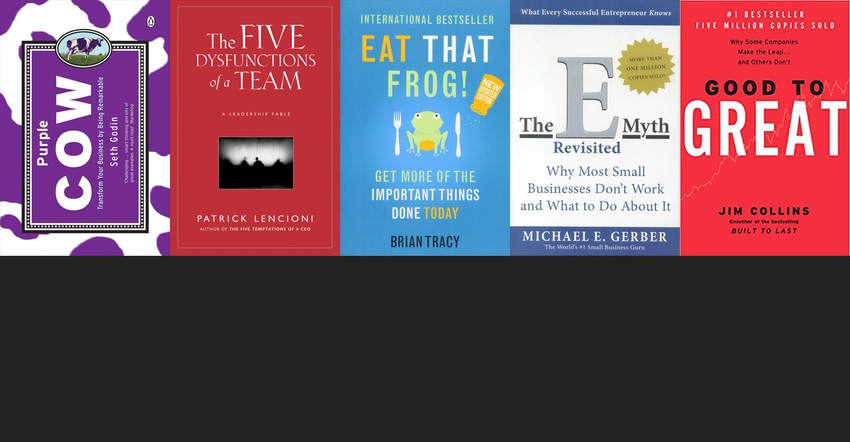
Reading fiction books can unlock new worlds and enrich the imagination. Reading certain business books, on the other hand, can unlock new skills and enrich your farming operation.
Why not make a New Year’s resolution to read a few more of the latter in 2018? Several Farm Futures columnists and bloggers make their case for their personal favorites:
Purple Cow — Does your product or service have trouble standing out? This book looks at what it takes to make your business more memorable or remarkable, according to Jessica Michael, entrepreneur and author of the Farm Futures “Smart Office” blog.
“Ineffective marketing can end a business,” she says. “That’s why your business must grab the attention of the customer — the same way a purple cow would. This book is excellent for entrepreneurs who are looking to make a change in their marketing strategy.”
The Five Dysfunctions of a Team — This book is highly applicable to farmers who are trying to scale up their operation or transition it to the next generation, says Tim Schaefer, farm adviser, who also writes Farm Futures’ Executive Matters column. Whether your personal team is family or beyond the family, the book’s core concepts still apply, he says.
“Poor communication is often blamed for many of the challenges on farms,” he says. “However, poor communication is sometimes the symptom, not the cause.
“This book is an easy read and presents five reasons businesses don’t communicate and achieve what they want from life and business,” Schaefer says. “It also presents some ways to turn your team into a highly tuned team focused on achievement.”
Eat that Frog — Since returning to the family farm in 2012, Illinois producer and Farm Futures blogger Maria Cox says she has digested several books on sales and marketing. (Don’t forget audiobooks as an option for listening in the pickup or combine, she adds.)
Cox calls one of these books an “oldie but goodie” — it’s 16 years old but still has plenty of good advice, she says. The title of the book comes from an old saying by Mark Twain about how “eating the frog” should always be done first thing in the morning.
“It’s about focusing on the most important tasks first and leaving less important tasks for later,” she says. “We use this concept every day on the farm. You do the most challenging thing first in the morning, like calling that big account you need to close. This book taught me to get the tough stuff out of the way first and to stop procrastinating.”
The E-Myth Revisited — Richard Dunn, farm financial planner and Farm Futures columnist, recommends this book not only to farmers, but also to anyone who is self-employed. The book argues that anyone who is self-employed has three jobs, not one. They have to be a visionary (Where are we going? What do we want to become?), a technician (do a great technical job at the work) and an administrator (keep the bills paid).
“This book talks about those differences and why it’s important to give time to all three facets,” he says. “I especially like this as an audiobook. It’s at least thought-provoking.”
Good to Great — Often heralded as one of the best business books of the last two decades, this classic by Jim Collins walks through several reasons why some companies make the leap, while others stagnate. The author profiles several well-known companies that have made this leap, Schaefer says.
“We can apply the same concepts to farming 2,000 acres or 22,000 acres,” he says. “Collins makes a compelling case to hire people based on inherent character traits, not skill. While there are other topics in the book, such as creating focus, the parts about getting the right people on your bus, then orientating them, is the most compelling for me.”
About the Author(s)
You May Also Like






